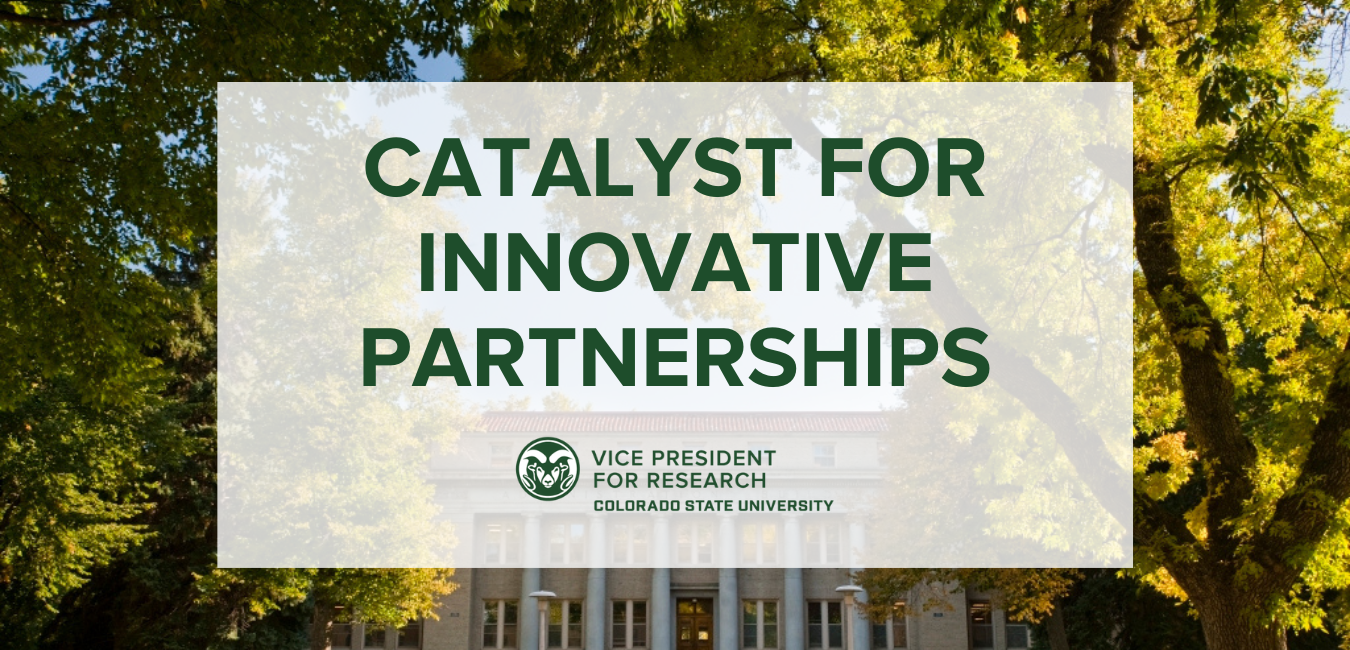
Five interdisciplinary teams of researchers from across Colorado State University have been selected by the Office of the Vice President for Research to form a third cohort for the Catalyst for Innovative Partnership funding program.
These teams were selected from a competitive pool of applicants to pursue significant issues in our society using research partnerships to create new opportunities and solutions.
“The CIP program is a premier interdisciplinary program, providing significant resources to teams to empower them to pursue their passions and create new solutions for some of our most significant societal problems,” said Alan Rudolph, CSU’s vice president for research. “Our office mobilizes significant resources in facilitating these teams to achieve their dreams, and we are proud of the results of the first two cohorts that have led to substantial outcomes.”
Each team will receive seed funding of up to $200,000. The teams are provided infrastructure support by OVPR to nurture the creation and delivery of solutions. This includes exposure to translation and commercialization opportunities, partnering within the team and disciplines, and partnerships external to the University.
“The financial returns from these teams are significant, but the impacts far exceed these outcomes for our institution,” said Rudolph.
OVPR launched the CIP program in 2015, investing over $2 million in the first two cohorts, which has yielded over $23 million in research awards by these teams.
2020 Catalyst for Innovative Partnership teams
Accelerating Translational Aging Research at CSU: Developing an Innovative Comparative Pipeline
Building on the launch of the Columbine Health System Center for Healthy Aging, this team will explore new correlations in aging in dogs as key models for age-related human cognitive decline. They will compare aging in cells in companion animals and people to study the correlations and mechanisms of human aging and diseases.
This team is co-led by Karyn Hamilton, professor of health and exercise science and director of the Translational Research on Aging and Chronic Disease Laboratory; Tom LaRocca, assistant professor of health and exercise science; Nicole Ehrhart, professor of clinical sciences and director for the Columbine Health System Center for Healthy Aging; Deana Davalos, professor of psychology; Haonan Wang, professor and chair of the Department of Statistics; Qian Zhang professional research associate in health and exercise science and Devin Wahl, Ph.D. Research Fellow in health and exercise science.
Soil Carbon Solutions: Mitigating climate change through cutting-edge research and implementation
CSU is well positioned to contribute to solutions to the climate change threats that face our society. This team will explore soil-based solutions as a critical carbon dioxide greenhouse gas removal technology and improve sustainable food, fiber and bioenergy production, and environmental health.
This team is co-led by Keith Paustian, University Distinguished Professor in soil and crop sciences and senior research scientist at the Natural Resource Ecology Laboratory; Francesca Cotrufo, professor of soil and crop sciences; Dale Manning, assistant professor of agricultural and resource economics; Jennifer Soong, research scientist in soil and crop sciences; and Bryan Willson, executive director of the Energy Institute and professor of mechanical engineering.
Center for Metabolism of Infectious Diseases (C4MInD) Accelerator
The recent COVID-19 pandemic reminds us of the complexity of diseases that can rapidly move in our society. C4MInD represents the first academic effort that targets the connection and roles between metabolism and infectious disease. The mission of C4MInD is to enable the development of new treatments, preventions, and diagnostics for infectious diseases by resolving host-vector-pathogen-environment interactions at a metabolic level.
This team is co-led by Rushika Perera, associate professor of microbiology, immunology, and pathology, and John Belisle, professor of microbiology, immunology and pathology.
VetVR: Virtual Reality for Veterinarians
CSU’s OVPR has invested in the expansion of augmented and virtual reality with impacts in translation into new applications. The VetVR virtual reality team will extend this impact by providing unique virtual training tools to be integrated into the teaching curriculum for remote, hands-on veterinary training to educate animal care professionals. Students, veterinarians, nurses and technicians will use this virtual training program to practice veterinary medicine.
This team is co-led by Pedro Boscan, professor of clinical sciences and anesthesiologist at the James L. Voss Veterinary Teaching Hospital; Francisco Ortega assistant professor of computer science; and Cyane Tornatzky professor of art and art history.
The Climate Adaptation Partnership (CAP) for Policy Innovation and Research Coordination
One of the biggest societal challenges we face is integrating our ever-expanding scientific knowledge into new policies that can create impact and change. This team will address this challenge and actively coordinate research and policy outreach to address climate change’s grand challenge.
They will examine how social and ecological systems can successfully adapt in the face of climate change and pursue unique fundraising and research opportunities to help train researchers in federal and state policy outreach.
This team is co-led by Courtney Schultz, associate professor of forest and rangeland stewardship and director of the Public Lands Policy Group; Leisl Carr Childers, assistant professor of history; and Tamera Breidenbach, graduate student in forest and rangeland stewardship.
“The OVPR is excited to embark with these teams on their journeys of discovery and look forward to the many impacts they will make in the future,” said Rudolph.